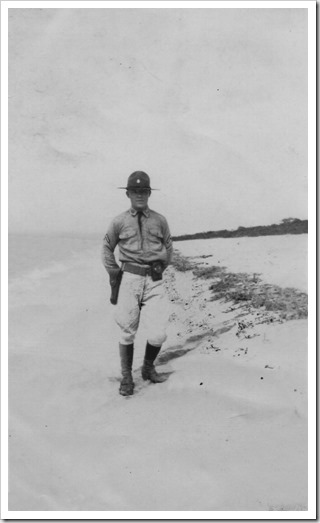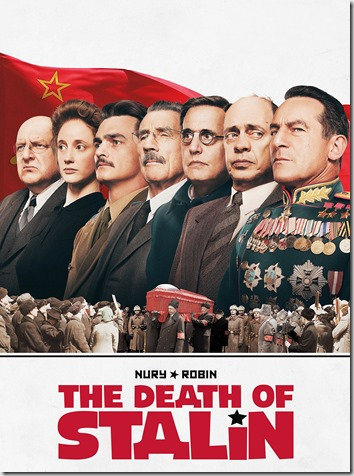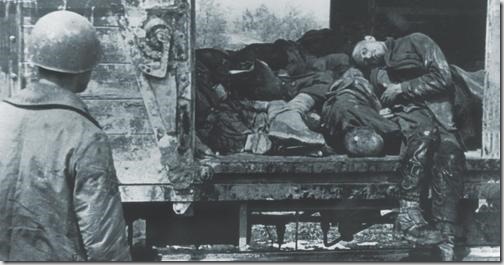Loquacious Lectures from the Fresh and the Foolish
13 October 2025 • by Bob • History, Humor
I saw the following quote from @SameOldStory on x.com earlier today:
"One disorienting thing about getting older that nobody tells you about is how weird it feels to get a really passionate, extremely wrong lecture from a much younger person about verifiable historical events you can personally remember pretty well."
Speaking from experience, that's a rather accurate observation.
Why we recognize Memorial Day
27 May 2024 • by Bob • Military, History
For those who are unfamiliar with his work, Ernie Pyle was an American journalist and war correspondent during World War II, whose frequent dispatches from the front lines with the troops let families on the home front know what it was like for their loved ones overseas. But more than that, Pyle's writing was unique, because he had a way of seeing things that were missed by others, and through his vivid descriptions of what he witnessed he could paint a picture for others to see the war through soldiers' eyes. Many of Pyle's journals read like poetry, which leads me to an entry he penned after walking the beaches at Normandy a few days after D-Day, which I think serves as an excellent reminder of why we recognize Memorial Day each year.
A Long Thin Line of Personal Anguish
Saturday, June 17, 1944
(From https://erniepyle.iu.edu/wartime-columns/personal-anguish.html)
NORMANDY BEACHHEAD, June 17, 1944 - In the preceding column we told about the D-day wreckage among our machines of war that were expended in taking one of the Normandy beaches.
But there is another and more human litter. It extends in a thin little line, just like a high-water mark, for miles along the beach. This is the strewn personal gear, gear that will never be needed again, of those who fought and died to give us our entrance into Europe.
Here in a jumbled row for mile on mile are soldiers' packs. Here are socks and shoe polish, sewing kits, diaries, Bibles and hand grenades. Here are the latest letters from home, with the address on each one neatly razored out - one of the security precautions enforced before the boys embarked.
Here are toothbrushes and razors, and snapshots of families back home staring up at you from the sand. Here are pocketbooks, metal mirrors, extra trousers, and bloody, abandoned shoes. Here are broken-handled shovels, and portable radios smashed almost beyond recognition, and mine detectors twisted and ruined.
Here are torn pistol belts and canvas water buckets, first-aid kits and jumbled heaps of lifebelts. I picked up a pocket Bible with a soldier's name in it, and put it in my jacket. I carried it half a mile or so and then put it back down on the beach. I don't know why I picked it up, or why I put it back down.
Soldiers carry strange things ashore with them. In every invasion you'll find at least one soldier hitting the beach at H-hour with a banjo slung over his shoulder. The most ironic piece of equipment marking our beach - this beach of first despair, then victory - is a tennis racket that some soldier had brought along. It lies lonesomely on the sand, clamped in its rack, not a string broken.
Two of the most dominant items in the beach refuse are cigarets and writing paper. Each soldier was issued a carton of cigarets just before he started. Today these cartons by the thousand, water-soaked and spilled out, mark the line of our first savage blow.
Writing paper and air-mail envelopes come second. The boys had intended to do a lot of writing in France. Letters that would have filled those blank, abandoned pages.
Always there are dogs in every invasion. There is a dog still on the beach today, still pitifully looking for his masters.
He stays at the water's edge, near a boat that lies twisted and half sunk at the water line. He barks appealingly to every soldier who approaches, trots eagerly along with him for a few feet, and then, sensing himself unwanted in all this haste, runs back to wait in vain for his own people at his own empty boat.
*
Over and around this long thin line of personal anguish, fresh men today are rushing vast supplies to keep our armies pushing on into France. Other squads of men pick amidst the wreckage to salvage ammunition and equipment that are still usable.
Men worked and slept on the beach for days before the last D-day victim was taken away for burial.
I stepped over the form of one youngster whom I thought dead. But when I looked down I saw he was only sleeping. He was very young, and very tired. He lay on one elbow, his hand suspended in the air about six inches from the ground. And in the palm of his hand he held a large, smooth rock.
I stood and looked at him a long time. He seemed in his sleep to hold that rock lovingly, as though it were his last link with a vanishing world. I have no idea at all why he went to sleep with the rock in his hand, or what kept him from dropping it once he was asleep. It was just one of those little things without explanation that a person remembers for a long time.
*
The strong, swirling tides of the Normandy coastline shift the contours of the sandy beach as they move in and out. They carry soldiers' bodies out to sea, and later they return them. They cover the corpses of heroes with sand, and then in their whims they uncover them.
As I plowed out over the wet sand of the beach on that first day ashore, I walked around what seemed to be a couple of pieces of driftwood sticking out of the sand. But they weren't driftwood.
They were a soldier's two feet. He was completely covered by the shifting sands except for his feet. The toes of his GI shoes pointed toward the land he had come so far to see, and which he saw so briefly.
Note: to read more of Ernie Pyle's writings, see Indiana University's online home for information and history about Ernie Pyle.
Reflections on Persistence, Pagans, and the Past
08 April 2024 • by Bob • History, Religion, Travel
A few years ago, my wife and I were fortunate enough to visit Rome, and among the thousands of photos that I took during our stay, this seemingly insignificant image of a nun walking through the remains of the Circus Maximus stands out for me.
Despite Hollywood's common depictions, the Romans did not typically sacrifice Christians in the Colosseum. On the contrary, the infamous martyrdoms of Christians were usually carried out in the Circus Maximus. With that in mind, when I saw a solitary nun crossing the empty field, I couldn't help but reflect on the irony of the scene. This stadium had once played host to the barbarous spectacle of martyring her predecessors, usually by beheading, or burning at the stake, or being fed to myriad wild animals. Yet on this day, many centuries later, there were nothing but ruins where the mighty empire of Rome once stood, and this nun could walk with impunity through the remnants of Rome's demise.
Anyway, these are the kinds of things that run through my mind when I'm visiting areas of historical significance. (Perhaps there's something wrong with me.)
What Hawaii Looked Like A Century Ago
25 January 2024 • by Bob • History
The following video from the National Archives shows what Hawaii looked like in 1924, which was 100 years ago this year, and by way of coincidence was the same year that my grandfather arrived in Hawaii to begin his four-year tour of duty in Oahu with the U.S. Army. Hawaii was a radically different world back then; Queen Lili'uokalani and the Hawaiian monarchy had been overthrown within a single generation prior to this film's creation, and much of the hills and valleys were still overgrown with acres of vegetation that are sadly missing now.
PS - the following photo is of my grandfather, Abner Dechant, as a young, Army Private standing on the beach in Hawaii back in the late 1920s.
Making a Point while Missing the Mark
28 October 2023 • by Bob • Religion
I recently read the essay Sometimes reforming: Martin Luther, the church and the rest of us, and if it had ended with "Sometimes the most we can do is 'give a witness' by our dissent and hope for reformation when future generations take up the cause for social and spiritual transformation," I would have thought that essay was a brilliantly-worded treatise on why Christians should reflect on Luther's words and actions this October 31st. Unfortunately, the essay didn't end there, and its author, Bill Leonard, spent the succeeding paragraph lashing out at
Throughout the "On All Hallows' Eve 2023" paragraph, Leonard doesn't mince words when he equates the actions and attitudes of those with whom he disagrees with the
When viewing this essay as a whole, what started out so well as a history lesson about Martin Luther and a call for contemplation on the role of dissent within our Christian lives quickly descended into a veiled attack on those with whom the article's author disagrees, and in so doing Leonard completely negates his opening quotation from Luther: "I will constrain no one by force, for faith must come freely without compulsion." With that in mind, I would suppose that some form of sarcastic kudos are warranted for the essay's author; his dissertation on Luther is so misguided that he completely misses the meaning of Luther's original prose, and he manages to publicly humiliate the church in the process. So I offer a brusque "bravo" to Bill Leonard for his essay; his opinions are exactly what the church needs today, but only if the church intends to fail miserably in modern society.
Egypt Discarded the Rosetta Stone, Now Egypt Wants It Back
05 December 2022 • by Bob • History, Opinion
A pair of articles recently caught my eye: Egyptians call on British Museum to return the Rosetta stone (from PBS) and Act of plunder: Egyptians want the Rosetta Stone back (from Al Jazeera).
As a student of history, I have a difficult time accepting the demands of countries to have treasures like Rosetta Stone "returned" to their country of origin when that country never bothered to take care of these treasures in the past. While the Rosetta Stone was created in Egypt, it was also discarded by Egypt and lost to the world for literally 2,000 years. What's more, the Rosetta Stone's discovery was over two centuries ago, it's purpose was deciphered by archeologists and scholars from central Europe - not Egypt - and it has been on public display for the rest of the world to admire for two centuries.
The Rosetta Stone's fate thus far - e.g. safely kept in a museum - has been far better than if it had been taken as spoils of war by a military commander, and spent the past two centuries languishing in someone's private collection, which might easily have happened if others had discovered the Rosetta Stone. Or as we have seen with ISIS running rampant throughout the Middle East, the Rosetta Stone might just as easily have been destroyed due to the ignorance of its discoverers.
At what point is an item of antiquity no longer within the realm of "possession" by a country that cared so little for its significance that it was used as building material? Now that 200 years have passed and Egypt has finally realized the Rosetta Stone's worth - if nothing more than museum fodder for tourist money - why should the rest of the world heed the requests of a country that didn't care enough to preserve it in the first place?
Europeans didn't raid an Egyptian museum to steal the Rosetta Stone from it's "rightful owners." On the contrary, French soldiers found the Rosetta Stone discarded in the desert, and realizing its potential significance, the French treated the Rosetta Stone with far greater care than Egypt had demonstrated. Eventually France lost its battles with England, and the British took possession of the Rosetta Stone and placed it in a position of prestige at the British Museum. As I said earlier, the Rosetta Stone has fared far better in the hands of foreigners than it had had in its country of origin.
Enough said. Rant over. Please resume your regularly-scheduled Internet browsing.
Auschwitz and Contemporary Politics
28 June 2022 • by Bob • History, Ponderings, Politics
A blogger who publishes his content using the moniker of The Catholic Traveler recently shared his observations on social media about his recent trip to the former concentration camp of Auschwitz. I visited the former concentration camp of Dachau when I was stationed in Germany back in the late 1980s, so I read his post with interest. After reading his post, I made an observation that I thought was worth sharing, but first - I have to put things in perspective. To do so, I will repost the full contents of his original blog, with full credit given to Mountain Butorac (aka "The Catholic Traveler") as its author.
I visited Auschwitz for the first time the other day. I'm not sure how I feel about it. It's one of the most awful places in the world, yet they sell donuts at the snack bar.
Many people traveling with me posted things like "no words." That's how I felt at first too. It's why I often wait a while before commenting on things - to be sure I have the right words, rather than just emotions.
During our visit the sky was grey and there was a steady cold rain. We trudged through thick mud to get from barracks to gas chambers to crematoriums. Everything about the visit was uncomfortable, even the guide.
She spoke English with a heavy German accent and an even heavier lisp. She showed no emotion at all, even when saying...
"These people are being separated from their families. They are told they are going to shower after the long journey, but they are being sent to die. Their family will never see them again."
"Kids and the elderly couldn't work. They were stripped naked and sent to the gas chambers to die. Here's their hair."
"Pregnant women and twins were used in medical experiments. Their screams could be heard across this courtyard."
She was great, I would use her again, but it was all very creepy. As it should be, I suppose.
Two things that struck me...
How often the guide stressed the proof of what happened there. I've heard of Holocaust deniers, but assumed it was a small group of people like those who think Elvis is alive.
I also never considered how many people thought what they were doing was right and just. They felt these people were a threat to their way of life. An inconvenience. A burden.
In interviews with SS guards after the war, they were asked how they could justify killing babies who were of no threat. Their answers were that they were useless, needed the attention of the mother to survive, and would eventually grow to be a threat.
When asked how they could do such horrid experiments on people, they responded that it was essential for improving their medical system. Doctors and nurses felt it was completely ethical to drown newborn babies and inject all sorts of things into people to further their science.
Just incredible. I'm still processing it.
I think it's a place you must visit. But don't get the donuts.
-- Copyright 2022 by The Catholic Traveler.
My personal experiences at Dachau evoked the same emotions that Butorac tried his best to explain, but words failed me as they did for him. When you are standing in a place where unspeakable evil was committed on a daily basis, it is hard to fathom how someone / anyone could allow themselves to torture and kill their fellow human beings without so much as a second thought.
And yet, as I considered recent political events in the United States and re-examined some of Butorac's statements after I removed his references to World War II, I was left with the following excerpt:
"I also never considered how many people thought what they were doing was right and just. They felt these people were a threat to their way of life. An inconvenience. A burden. In interviews ... they were asked how they could justify killing babies who were of no threat. Their answers were that they were useless, needed the attention of the mother to survive, and would eventually grow to be a threat [to their way of life]."
The remaining verbiage that we are left with is just as incredible - and just as creepy - when compared to the arguments that I hear in sound bites on the daily news. The devaluation of innocent lives whom people regard as an inconvenience, or a burden, or a threat to the way of life to which they have grown accustomed has apparently not been limited to history or geography.
I Wonder If History Was Like This
02 June 2022 • by Bob • Humor, History
I love studying history, and I must admit that the majority of books I typically read are on that subject. That said, I recently stumbled across the following video from Stephen Fry and Hugh Laurie, which an amusing look at the signing of the Treaty of Westphalia. Even though I know this video is meant humorously, there are times when I wonder how historically accurate events like this might have been.
![]()
The Inevitable Demise of Dictators
05 March 2022 • by Bob • History, Politics
Today is the 69th anniversary of Josef Stalin's long overdue demise, which means it's time to re-watch one of my favorite dark comedies: The Death Of Stalin. However, given recent events in Ukraine, it's nice to have a reminder that Russian dictators - like all dictators - will eventually wither and die and become nothing more than worm food.
Facing the Horrors of War
31 December 2021 • by Bob • History, Military, Politics, Ponderings
Like many of my colleagues from the 511th MI Company, I visited the Dachau Concentration Camp during my tenure in Fulda, and it was a sobering experience. It is difficult for any rational individual to come to terms with the sheer magnitude of horrors that took place in that single camp. On that note, I just read the following article from HistoryNet, which describes the retributory actions of US soldiers during the liberation of Dachau:
I have to admit, I find it difficult to find fault with soldiers who retaliated against the guards that were still defending the camp when the US Army arrived. It is easy during a time of relative peace to passively judge the actions of soldiers who exacted vengeance upon unarmed guards several decades ago, and it is likewise easy during peacetime to believe that any of us might have behaved differently in a similar circumstance. Nevertheless, none of us trod the path those soldiers walked, and I am willing to bet that coming face to face with Dachau's camp guards - whom we now perceive as inhuman monsters - could alter anyone's sense of morality.
ADDITIONAL REFERENCES:
More information about the Dachau Concentration Camp and the reprisals that were taken by US soldiers is available in the following WikiPedia articles:





